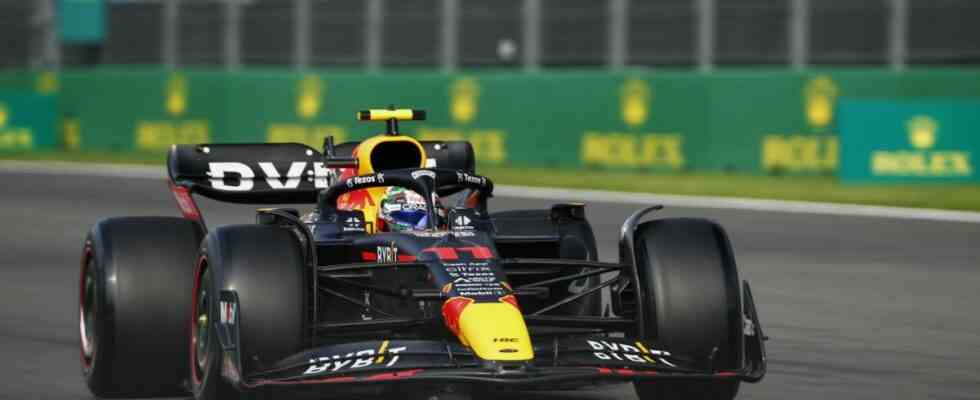The defense takes place after the trial. The judges make a verdict, but do not go into detail in the reasoning. Neither should they, because that’s the deal. That’s how jurisdiction works in Formula 1. The racing series is only a sport for the few hours on the track, otherwise it’s business. A rather complicated, highly technical and highly political one.
It has been known for a good three weeks that Red Bull Racing, the team of world champion Max Verstappen, exceeded the applicable budget limit in the premier class for the first time last year. Someone from the circles of auditors or the world automotive association Fia must have chatted – and found the right contacts at Ferrari and Mercedes. Since then, a public battle of prejudice and protestations of innocence has raged.
Red Bull presented themselves as victims, the opponents wanted to see victims. Then the guilt of the racing team was formally determined – and finally, negotiations continued behind the scenes as to whether Red Bull would appeal or plead guilty. Red Bull is now doing the latter. It has advantages for both sides: the matter is off the table, the face of the Fia as strict rule keeper is preserved, further damage to the image is minimized, the sporting result from last year is finally official. And the sinners are allowed to decide for themselves what they want to reveal of the transgression. Accepted Breach Agreement that’s what it’s called.
“If we had used all legal options, the process could have dragged on for another twelve months,” says team boss Christian Horner. “That would have been months of more speculation, sniper allegations and defamatory comments. So let’s swallow the toad.”
The arbitration process was interrupted by the death of Red Bull founder Dietrich Mateschitz last weekend, which is why the judiciary only happened on the day of practice for the Mexican Grand Prix: for exceeding the cost cap of $148.6 million by 1.6 percent – 2.15 million dollars – the Austro-British racing team collects a fine of seven million dollars and has to live with limited development times in the wind tunnel for a year.
Like an accountant who takes a particularly close look, team boss Christian Horner put on his glasses during his justification speech at the Autodromo Hermanos Rodriguez. And he pointed out a regrettable procedural error, just a misunderstanding, a difference of opinion, without which his racing team would have been only 0.37 percent over the limit, the trifle of 501,850 dollars. A new interpretation of the accounting and an additional tax payment would have contributed to the different perspectives on the figures. World champion algebra.
One would have loved to know how much too high the canteen subsidy was that Red Bull had given its staff and what a racing team pays in bonuses and severance payments. Or what exactly happened with the hospitality costs at the racetrack. And whether the dream salary of design genius Adrian Newey played a role. Some would have liked to enjoy it, unfortunately none of this will exist, but at least the examiners had listed the 13 areas in detail in which they had a different opinion than Red Bull. And: The world automobile association Fia actually took it seriously and at least set a benchmark put in for the coming exams, even if there is no clearly defined catalog of penalties, but only a five percent goodwill arrangement.
Red Bull asserts: There was no development advantage
Horner says the penalty was only approved “reluctantly” and mainly “in the interest of sport.” Knowing full well that a neutral financial court might have called for even higher sums. Of course there was never a development advantage through the self-increased budget, of course. Everyone listening to Horner’s solo press conference could picture the sympathetic grin of Mercedes team boss Toto Wolff.
Wolff nevertheless confidently accepted the trend-setting judgment for the competitor: “I think that from our point of view every penalty is of course too little, but of course always too much for them.” The manager doesn’t like to quantify the value of the missing wind tunnel time, the seven million already: “In absolute figures that’s a lot of money. But considering the other investments maybe not that much. The damage to the image is probably the biggest.” But what counts for him is the high level of deterrence.
Mercedes praises the Fia leadership
He doesn’t want to hear the explanations of his intimate enemy: “Nine teams adhered to the regulations and stayed below the upper limit. In this sport, marginalia determine success, everything else is just gossip. There is no mitigating factor.” Which is why Wolff is also happy about the unyielding attitude of the world automotive association Fia and its President Mohammed bin Sulayem: “What I see as positive is the strong leadership. Nothing was swept under the carpet.”
The deduction of ten percent wind tunnel time is actually a huge disadvantage, Horner calculates that this is between a quarter and a half second lap time: “It gives our rivals an advantage, which is why they called for a draconian penalty. Burning down our wind tunnel would have certainly not enough for them.” The Brit quickly makes a counter calculation again: “What we lose in time in the wind tunnel, we gained in motivation.”

